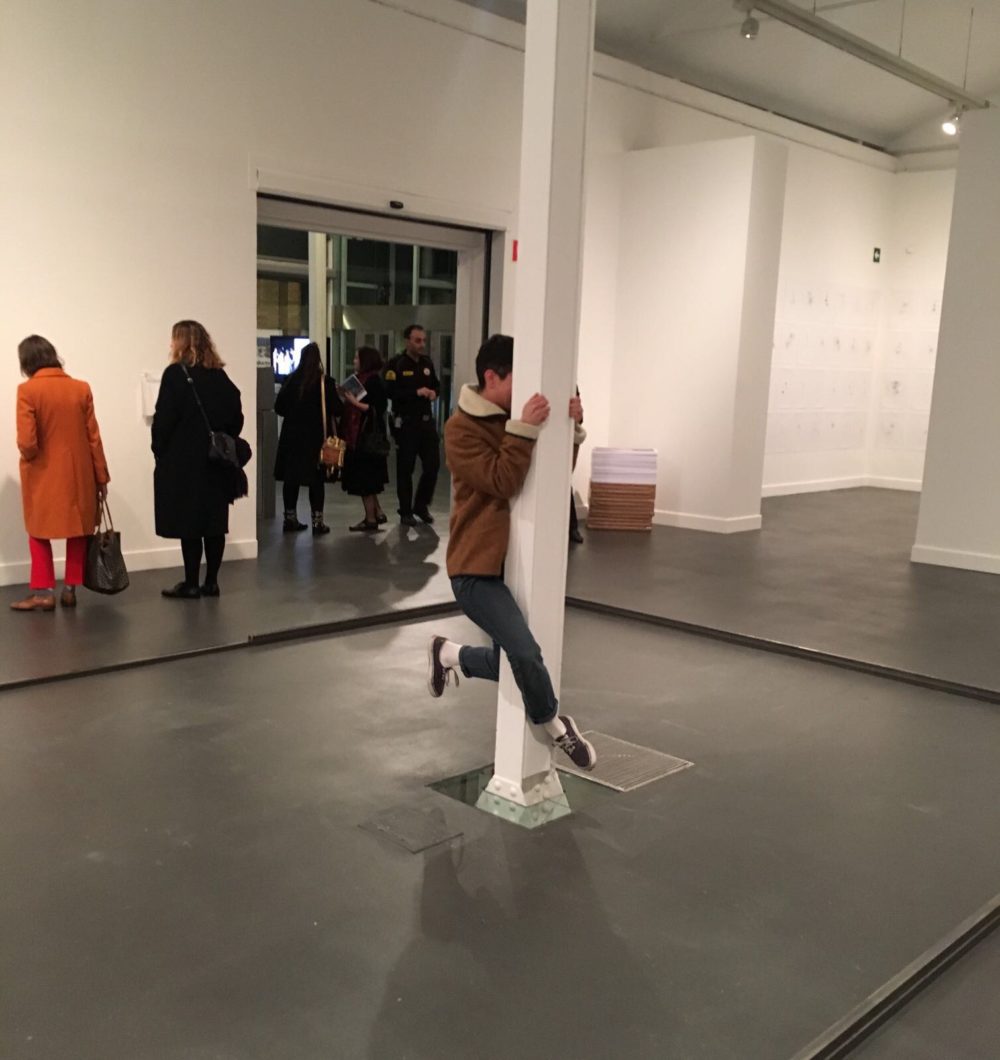Search
To search for an exact match, type the word or phrase you want in quotation marks.
A*DESK has been offering since 2002 contents about criticism and contemporary art. A*DESK has become consolidated thanks to all those who have believed in the project, all those who have followed us, debating, participating and collaborating. Many people have collaborated with A*DESK, and continue to do so. Their efforts, knowledge and belief in the project are what make it grow internationally. At A*DESK we have also generated work for over one hundred professionals in culture, from small collaborations with reviews and classes, to more prolonged and intense collaborations.
At A*DESK we believe in the need for free and universal access to culture and knowledge. We want to carry on being independent, remaining open to more ideas and opinions. If you believe in A*DESK, we need your backing to be able to continue. You can now participate in the project by supporting it. You can choose how much you want to contribute to the project.
You can decide how much you want to bring to the project.

In the Fermi paradox we find the enunciation of a wish and its empirical deficiency. To the great probability of the existence of other intelligent civilisations in the observable universe we must add the lack of proof of these civilisations. To the great ontological question that mankind has been asking itself for centuries, i.e., Who are we?, we must add another question charged with the underlying fear our specie has of loneliness: Are we alone in the universe?
The Fermi paradox appeared in the United States in the fifties, at a time of atomic euphoria. In response to the contradiction between belief and evidence, Enrico Fermi introduced the zeitgeist of his age into his conclusions, along with a considerable dose of anthropocentrism: why are there no signs of life in the universe? Because if any advanced civilisation had existed in the galaxy it would have headed towards its own annihilation thanks to its technological development. If we are alone it’s because others before us pushed their own nuclear button without taking into consideration the holistic consequences of that minimal gesture. As we await confirmation, the Golden Record of Voyager 1 is crossing the cosmic void. Perhaps in 40,000 years’ time the members of a civilisation capable of carrying out interstellar journeys will bump into it by the star that is closest to the solar system, and be able to hear the information on the record through a gramophone of sorts. Or perhaps the solar system we belong to was a sort of Galactic Radio Quiet Zone forbidding other inhabitants of the galaxy to emit signals to communicate with one another because it is they who are studying us at the distance required by cautious strategy.
The Fermi paradox is also known as The Great Silence. This second name suggests a different conclusion to that of Fermi’s, and has been collated by Ted Chiang in the essay on the homonymous project by Jennifer Allora and Guillermo Calzadilla, in which a parrot tells us we have never actually been alone — not in the Universe but on Earth: ’One proposed solution to the Fermi paradox is that intelligent species actively try to conceal their presence, to avoid being targeted by hostile invaders. Speaking as a member of a species that has been driven nearly to extinction by humans, I can attest that this is a wise strategy. It makes sense to remain quiet and avoid attracting attention.’ Fermi’s response takes the death wish of psychoanalysis to such a great scale that outer space could be seen as an endless necropolis in which stars are not the only bodies that disappear at the speed of thousands of light years. The inference of this anonymous parrot appeals, however, to a triggering of intelligence based on a simulacrum of absence through silence.
Stealth as a strategy of survival in a universe that is not as silent as we had thought for thousands of years. Black holes resist being seen through the eye of a telescope; they can only be heard. Ted Chiang’s parrot, however, signals another silence, one that does not derive from the absence of sound but is produced instead by the self-absorption of the human race, unable to do without language when it comes to understanding all that which surrounds it. Indeed, if we are at all able to understand a message addressed to us by a parrot disappointed in the human race this is because it takes the form of a language we recognise. It partakes of the same discursive intelligence. Indeed, it doesn’t even speak to us — Ted Chiang speaks in its name and the parrot speaks in the name of an animal species that does show signs of intelligence and, in turn, works as a rhetorical device reminding us that the theories stating that what we call nature also has a language with which other entities speak to us. Whether or not we are able to decode it or listen to it is our problem, not theirs.
In its privileged intelligence associated with discursive language, mankind tirelessly seeks forms of life with which to relate as an equal. Or even, from a desire for cosmic subalternity, it seeks civilisations more advanced than our own that may move us from the central position that our understanding of reality has guaranteed us for years; that may silence us, strike us dumb or leave us voiceless. If telescopes were aimed at the Earth, the response would probably be no different. We have forced technology to listen with our ears. The great silence inhabits our world. To say that nature, and by extension things, speak (to us) implies an attempt to inspire all entities more ethically. This rhetorical exercise, however, preserves the reciprocity between language and ethics. Speech as a privileged quality assigned to those bodies that objectively do not speak, or, in the event of making sounds, these do not contribute to the intersubjectivity that generates language. To speak ’to’ is not the same as to speak ’with’. The ethical dimension of language is based on this aspect, on making us human by means of interaction through language. Could this exist as an ethical dimension of silence? Does (political) agency inevitably involve language? What capacity does silence have for action? Is it necessary for things to speak to us in order for us to take them into account? Are things able to emit discourse without speaking? Or to speak without having a discourse? Is discourse essential for the shared vitality of all things?
As is so often the case, the answer to many questions lies in science fiction. In spite of the contradiction entailed by the fact of having been produced by human language, Solaris and The Universe of Things present situations in which contact with other forms of life doesn’t come through discourse. Solaris is a living ocean planet that resists scientific knowledge. It is a silent form of life that nonetheless has a capacity for action. To the failure of language as a means of communication between different forms of intelligent life we must add the failure of language when it comes to understanding a world that transcends the frontiers of the Earth. Solaris communicates with human beings, yet it continues to form a part of the great silence. We cannot communicate with the planet and do not know what to say about it. If it cannot fulfil human expectations of the contact this is because it exceeds them, gaining access to the interior life of the crew members of the spacecraft that has followed it for years. Solaris is a body that transcends its own body. The Universe of Things introduces an alien civilisation into our planet, the Aleutians, whose superiority lies in the fact that their technology is literally alive and that they form a part of a material continuity without frontiers between bodies. They are able to share feelings or memories through the exchange of chemical substances, with no need for either oral or written language. Life is an experience that has no need to be translated or spoken. Living beings in a world totally alive where there are no differences between them and things. Things speak, not because they have the capacity of language but because they are intrinsically alive, and it is this vital force that produces the continuous interaction between them and the Aleutians. A language exchange produced by the contact between bodies that doesn’t involve the literality of touch but the experience of the whole environment as a network of connections. Perhaps the ethical dimension of an understanding of the world that is less anthropocentric doesn’t reside in making things speak or in asking them to have a language of their own, but in their right to silence and in accepting that this right is as important as our discursive dimension.

artwriter_curator_esnorquelmaker_chocolateresearcher_technodancer__bikeenthusiast_coffeeaddicted_
"A desk is a dangerous place from which to watch the world" (John Le Carré)